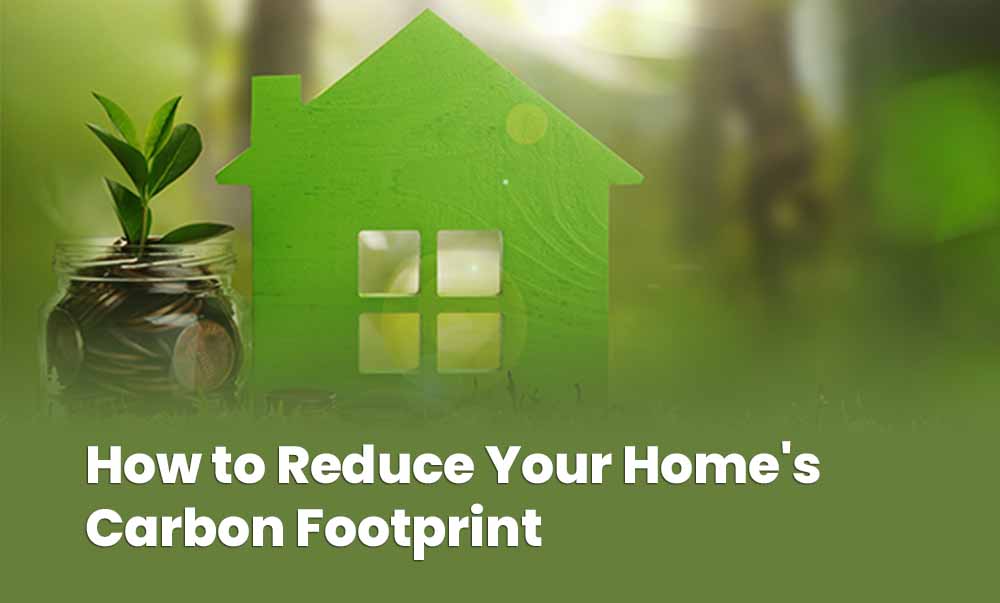As climate change becomes an increasingly pressing global issue, reducing our carbon footprint has never been more important. For homeowners in Ghana, taking steps to make your home more eco-friendly can not only help the environment but also reduce energy costs and improve overall quality of life. In this guide, we’ll explore practical ways to reduce your home’s carbon footprint, making your living space more sustainable and efficient.
Understanding Your Carbon Footprint
Before diving into how to reduce your home’s carbon footprint, it’s important to understand what it is. A carbon footprint measures the total greenhouse gases (GHGs) produced by human activities, typically expressed in equivalent tons of carbon dioxide (CO2). For homes, this includes energy used for heating, cooling, lighting, and appliances, as well as the carbon emissions from water use and waste production.
1. Optimize Energy Use
Switch to Energy-Efficient Appliances
One of the most effective ways to reduce your home’s carbon footprint is to switch to energy-efficient appliances. Look for appliances with high energy efficiency ratings, such as those with the ENERGY STAR label. These appliances use less electricity and water, reducing your household’s overall energy consumption.
Install Solar Panels
Ghana has an abundance of sunlight, making it an ideal location for solar energy. Installing solar panels can significantly reduce your reliance on fossil fuels, lowering your carbon footprint. Solar energy is a clean, renewable source that can power your home’s electrical systems, reducing your energy bills and environmental impact.
Use LED Lighting
Switching to LED light bulbs is a simple yet effective way to reduce energy consumption. LED bulbs use up to 75% less energy than traditional incandescent bulbs and last significantly longer. This not only cuts down on energy use but also reduces the frequency of replacements.
2. Improve Home Insulation
Seal Windows and Doors
Proper insulation is crucial for reducing energy waste. Ensure that windows and doors are properly sealed to prevent air leaks. Use weather stripping and caulking to seal gaps, which helps maintain a stable indoor temperature and reduces the need for excessive heating or cooling.
Insulate Walls and Roofs
Investing in good insulation for your walls and roofs can greatly improve energy efficiency. Insulated homes require less energy for heating and cooling, as they retain the desired temperature more effectively. This leads to lower energy consumption and a reduced carbon footprint.
3. Water Conservation
Install Low-Flow Fixtures
Installing low-flow showerheads, faucets, and toilets can significantly reduce water usage. These fixtures are designed to use less water without compromising performance, helping to conserve one of our most precious resources.
Harvest Rainwater
Ghana’s rainy season provides an excellent opportunity to harvest rainwater. Collecting and storing rainwater for use in gardening, cleaning, and even for toilet flushing can reduce your dependence on municipal water supplies, lowering your water footprint.
4. Sustainable Waste Management
Reduce, Reuse, Recycle
Adopting a reduce, reuse, and recycle approach can minimize waste production and reduce your home’s carbon footprint. Reducing the amount of waste you produce, reusing items whenever possible, and recycling materials helps lower the amount of waste that ends up in landfills, reducing greenhouse gas emissions.
Compost Organic Waste
Composting organic waste such as kitchen scraps and yard trimmings can significantly reduce the amount of waste sent to landfills. Composting also produces nutrient-rich soil that can be used in your garden, promoting sustainable gardening practices.
5. Sustainable Transportation
Adopt Eco-Friendly Transportation
Transportation is a significant contributor to carbon emissions. Consider adopting more sustainable transportation methods, such as walking, cycling, or using public transportation. If you need to drive, consider carpooling or using a fuel-efficient vehicle to reduce your carbon footprint.
Electric and Hybrid Vehicles
For those in the market for a new vehicle, electric and hybrid cars offer a more environmentally friendly alternative to traditional gasoline-powered vehicles. These vehicles produce fewer emissions and can be charged using renewable energy sources, further reducing your carbon footprint.
6. Eco-Friendly Landscaping
Plant Native Trees and Shrubs
Planting native trees and shrubs around your home can help absorb CO2, provide shade, and reduce cooling costs. Native plants are adapted to the local climate and require less water and maintenance, making them a sustainable choice for landscaping.
Create a Green Roof
Green roofs, or living roofs, are covered with vegetation and provide numerous environmental benefits. They can reduce energy consumption by providing natural insulation, absorb rainwater, and improve air quality by filtering pollutants.
7. Sustainable Building Materials
Choose Eco-Friendly Materials
When building or renovating your home, opt for sustainable building materials such as bamboo, reclaimed wood, or recycled steel. These materials have a lower environmental impact compared to traditional building materials and contribute to a greener home.
Use Low-VOC Paints
Volatile organic compounds (VOCs) in paints can contribute to indoor air pollution and have negative health effects. Using low-VOC or zero-VOC paints can improve indoor air quality and reduce your home’s overall environmental impact.
Reducing your home’s carbon footprint in Ghana is not only beneficial for the environment but also for your wallet and well-being. By making conscious choices about energy use, water conservation, waste management, transportation, landscaping, and building materials, you can create a more sustainable and efficient home.


